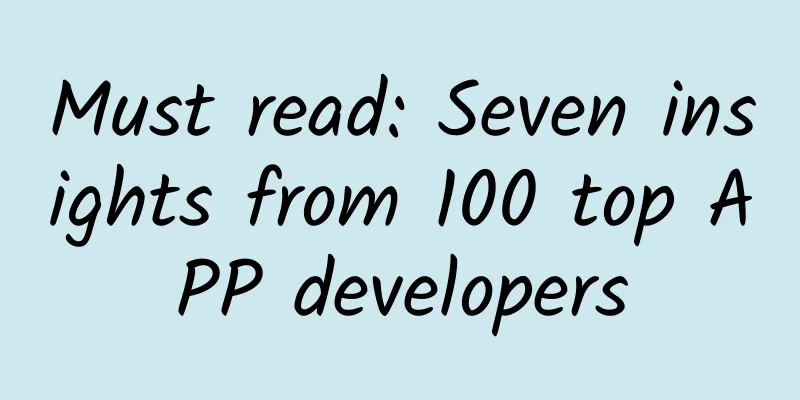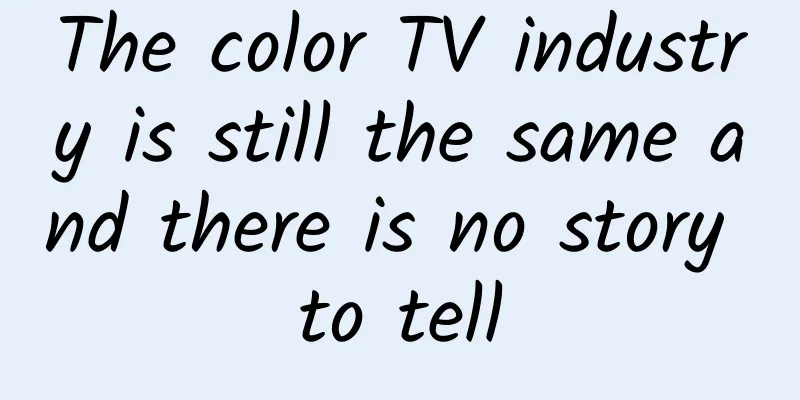Must read: Seven insights from 100 top APP developers

|
As you can see, there are already over a million apps in the App Store and Google Play, and the market is crowded. However, I still believe that developers can make a good living and build a business from mobile apps. In fact, since starting the Mobile App Chat podcast, I’ve had the pleasure of interviewing over 100 entrepreneurs, including Chris Batron (co-founder of Shazam), Paul Haddad (Tapbots), Lucy Zhang (Facebook Messenger), and many more. I learned a lot from these interviews, including how to effectively run an app business and how to start developing apps. How can you develop a successful app? I learned a lot from interviewing hundreds of top app developers. Here are the 7 most valuable experiences: 1. If you have a desire, you will achieve it. “The things that trouble you deeply will also make you who you are.” — Ouriel Ohayon, CEO and co-founder of Appsfire What you want to create must be something that you are extremely eager to see in the world. This passion and energy will be integrated into your application, becoming the initial velocity of its take-off and bringing you positive feedback. It is very important to regard yourself as the most important user of the app. I once asked Paul Haddad, the developer of Tapbots, what his favorite app was, and he told me that it was his own app, Tweetbot. He didn't mean to brag. Instead, he sounded serious when he said it was his most used app. Appsfire CEO Ouriel Ohayon gave the same answer in an interview. Appsfire went through multiple iterations until the entire team used it every day, and the right new features were developed and useless features were removed. Oftentimes, we focus on profit and ignore our core values, but with Tweetbot, you can really feel Paul's passion and his meticulous attention to detail. He built something he wants to use every day. This is what each of us should do when building apps. 2. Talk to real users As developers, many times we are embarrassed to communicate with our target audience. Programming is both a gift and a curse. We can create anything we want to see in the world through programming, so it is a gift. However, sometimes we are trapped in the code and not interact with real users, then it becomes a curse. When Jake Fuentes created Level, a real-time money tracking app that tells you how much money you have left to spend this month based on your budget and current spending range, he approached two people he knew and asked them if they could let him follow them while they shopped. Jake wants to understand how users make consumption decisions so that his app can better meet the needs of users. When someone is hesitating between two pairs of jeans, he wants to understand how this person makes the decision to buy or not. Jake wanted to create an app that would let users know how much money they were spending in real time. This app would not be cluttered with redundant information like its competitors. Only through conversations with users did he figure out what information and features needed to be presented in the app. Another way to talk to real users is to post an ad on Craigslist for each test user. For an app I was about to launch called oSnap (a completely gesture-based camera app that lets you tap anywhere on the screen to take a photo), I used Google Hangout to connect with someone I found on Craigslist to get some early user feedback. I learned through Hangouts that people who take selfies tend to use the rear camera because it has a higher resolution than the front camera. Although this is not the real problem I want to solve, it also makes me know that there may be such a demand in the market, and maybe I can seize it. Remember to try to find some test users to get real user feedback. 3. Don’t be too obsessed with your own ideas It should be common sense that ideas are cheap coins and their success depends entirely on execution. However, no matter how familiar we are with this principle, it is still easy for us to get caught up in our own ideas. Love blinds us, so we don’t seriously research the market for competing products, nor do we seriously think about whether this product is worth making. Worse, even if we are willing to do research, this obsession often makes the research subjective, and we will choose data that favors our own ideas. Oftentimes, having a naysayer is very important and their feedback is invaluable. They can help us see the flaws in our ideas so that we can make the necessary improvements. 4. Have invisible motivation "Passion is a kind of energy. What makes you passionate also makes you powerful. You just need to feel this power." ——Oprah Winfrey. The vast majority of apps in the App Store don’t make much money, so if you decide to make an app, make sure you have enough passion. I have interviewed more than 100 app developers, and few of them are as passionate about developing their first app as they were when they were developing it. Being able to adapt and continue to learn is the key to success. Remember, Rovio actually developed 51 games before Angry Birds. Those people who are well-known for being "overnight successes" have actually been developing apps for about 10 years. If you ask any famous game developer, they will tell you that they will not stop developing games even if they don't make any money. They just love to develop games and play games, that's all. Without this invisible driving force, if success does not come as soon as you expected, all your enthusiasm will be in vain. 5. It’s never too late Yes, the golden age of the App Store has passed, but there is still a lot of room for mobile applications. The media may only report on Angry Birds or Temple Run, but there are still a group of independent developers in the world who regard the development of apps as their career and the mainstay of their life. I once liked Mochi Bits very much. It was run by a two-person team and made text games for the App Store, Google Play, and Amazon Store. Kyle Yamamoto, one of the founders, proposed an interesting concept - "blue chip developers", referring to those developers who make a living by developing apps on their own and have never received a penny of investment from the outside world. Solve problems, design carefully, think what others think, and do what others urgently need. If you do these well, the door to the market will still open for you. 6. Only focus, ****** On the web, the more features a product has, the more attractive it is to users. But on the other hand, in the fragmented mobile space, the trend is to reduce features and focus as much as possible. When Songza was launched, there were already two competitors in the market, Pandora and Spotify. However, Songza brought a subversive music listening experience. Songza selects music for you based on your current activity. In short, Songza gives you the right music at the right time, which is why it won the App Store's Best App Award in 2012. Focus on one thing only. The "one" in this "only" must be something small and meaningful to people. Don't keep thinking about making a big deal. Don't keep thinking about things that don't exist in real life. The application of technology must solve practical problems in people's lives. 7. Build your own platform Anyone who has blogged knows that it is not easy to get others to comment on your app. I now run my own blog and push it to iPhoneLife. I see hundreds of articles published every day, but 95% of them are ignored. However, if you build your own platform — whether it’s a blog, podcast, or video show — you’ll have your own audience and can easily promote your next app. You won’t have to rely on external factors to promote it. Also, you don't need a huge community. In fact, a smaller, more active community is better. Remember, you have to bring value to your audience first and foremost. Gary Vaynerchuk talks about this in his new book, Jab, Jab, Jab, Right Hook, where he says you have to keep prodding your audience with great content so that when you need to throw the right hook at them and ask them to do something in return, like buy your book, they’ll be more willing to do it. Here are some other app developers who have successfully built their own platforms: David Smith, Developing Perspective Marco Arment Carter Thomas, Blue Cloud Solutions It doesn’t matter who you know, what matters is who knows you. If I could give you one most important piece of advice, it would be to build a platform that you are passionate about maintaining. If you don’t like writing, then don’t choose a blog. I love talking and interviewing people, so a podcast was a natural choice for me, but you can choose other options, such as signing up for Dribbble if you need to showcase your best designs. If you take away nothing from this article, remember this – build your own platform. Now! in conclusion I’ve heard some great advice – “Learn from those who have experience.” There is no shortage of advice on the Internet, but you need to find those who have "gone over the hill" and achieved success in the field where you want to succeed. The advice they can give is the most valuable. I wanted to learn from the best and take my app business to the next level, which is why I started my own podcast. |
<<: HTML5 best practices to make Web App faster
>>: You must know: 22 weird tricks for iOS development
Recommend
Why iOS may become the next generation of enterprise operating system?
[[150553]] Throughout my life, Windows and Mac op...
Online Qianchuan System Course "Qianchuan Explains"
1. Course Introduction Online Qianchuan System Co...
The higher the altitude, the taller the tree. Why are the "tallest trees in China" discovered one after another in Tibet?
Audit expert: Shen Tingting PhD in Botany Recentl...
User operation: a simple and easy-to-use user growth methodology
This article introduces in detail the specific im...
Is walking too slowly a "sin"? Even walking has so many rules?
Some references: [1] Liang Yi, On the Concept and...
8,000 years ago, Zhejiang people were already rowing small boats
Reindeer are good at swimming, but water is not t...
Tik Tok Operation Toolkit from Beginner to Master
Introduction to the Douyin Operation Toolkit: Cou...
Fission is complete, how to do refined user retention work
At the end of the previous article "There se...
How much does it cost to rent a G-port server in Zhengzhou?
How much does it cost to rent a G-port server in ...
Xigua Video’s Millionaire Heroes: Presenting a powerful way to attract new users to the App?
In the past week, games that require answering qu...
KOLs are being eliminated faster
Internet celebrities, KOLs , big Vs, self-media, ...
"China's Sky Eye" has made new discoveries!
The "big pot" in Guizhou has made new d...
Can nubia Z9, a milestone in the borderless era, become a new benchmark for domestic mobile phones?
I don’t know since when, domestic smartphones hav...
Video tutorial for beginners on how to play King of Glory! Video tutorial on how to play King of Glory! Baidu Cloud Disk resources free download
As Honor of Kings becomes more and more popular, ...









